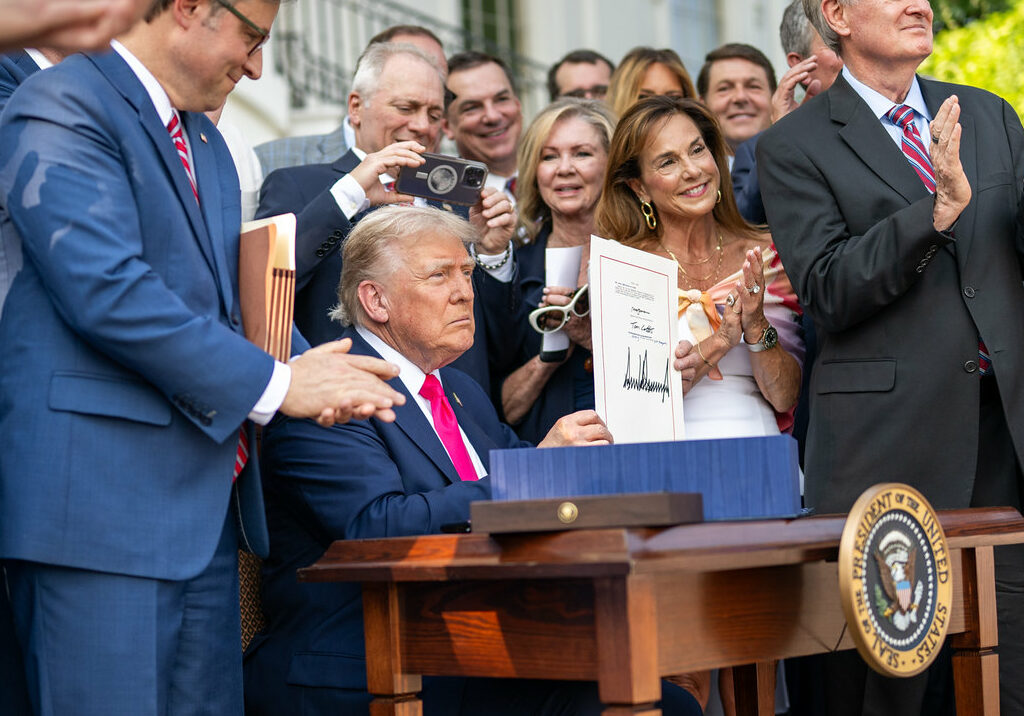In today’s political reality, legislative wins don’t come easily for those dedicated to pro-taxpayer policies and limited government.
While not perfect, President Trump’s One Big Beautiful Bill Act (OBBBA) delivers the most significant conservative victories in recent memory: broad and permanent tax cuts, entitlement reforms and a partial repeal of the Green New Deal.
These successes didn’t happen by accident. They were a result of principled leadership by the two dozen members of the House Freedom Caucus to ensure the most fiscally responsible version possible reached the president’s desk.
To be clear, all congressional Republicans deserve credit for passing OBBBA. With historically slim majorities, House Speaker Mike Johnson and Senate Majority Leader John Thune had to balance the input of every member from their conference amid an onslaught of pressure from Democrats and special interest groups. At any point, a handful of lawmakers could have upended this fragile process, leaving the bill dead in the water.
Indeed, many observers suggested that either GOP moderates or the Freedom Caucus would kill the bill. Still, instead they came together to deliver $5 trillion in tax relief for families and businesses of all sizes. The legislation also makes permanent key cost-recovery tax provisions — measures expected to create hundreds of thousands of jobs, boost economic growth and accelerate investment nationwide.
From day one through final passage, the caucus consistently fought to include as many meaningful reforms and taxpayer savings as could realistically pass the House. It secured $1.1 trillion in deficit reduction, almost four times the original $300 billion floated earlier.
The bill’s most significant changes are the reforms made to America’s overgrown social safety net, which was being defrauded and treated like a piggy bank. While many were focused on the tax provisions, the Freedom Caucus was focused on addressing ballooning federal spending.
It led the charge to bring generational and commonsense reforms to bloated programs like Medicaid and food assistance. Its efforts significantly tightened work requirements, ensuring beneficiaries work, volunteer, or go to school for 20 hours a week to be eligible for benefits. With almost 5 million able-bodied adults enrolled in the program, it’s time for them to enter the workforce to qualify for government-sponsored healthcare.
These work requirements will make Medicaid stronger for those who need it, like low-income children, pregnant women, seniors, people with disabilities, and those who have fallen on hard times.
OBBBA also phased down the Medicaid provider tax threshold from 6 percent to 3.5 percent, saving hundreds of billions and discouraging Obamacare expansion. Medicaid expansion states often take advantage of the system through provider taxes, allowing them to extract more funding from the federal government.
Even then-Vice President Joe Biden has labeled the tax a “scam.” Now, thanks to Trump and the Freedom Caucus, the scam is finally corrected.
As usual, the House Freedom Caucus members were labeled “holdouts” throughout the process, not because they opposed the bill but because they refused to go along for the sake of political convenience.
Instead of backing down, the caucus worked to steer the bill in a more conservative, pro-taxpayer direction.
Another notable achievement for the caucus is major rollbacks to the Inflation Reduction Act, one of the most expensive bills ever enacted into law. That law focused heavily on climate change and renewable energy, with tax credits and other incentives that some experts believe will cost upward of $5 trillion by 2050. These are expensive subsidies that favor intermittent forms of energy, such as solar and wind power, over reliable fuels.
Thankfully, those concerns were addressed in the final bill, though not as aggressively as in the initial House bill. However, the final bill includes hundreds of billions of dollars of rollbacks for clean energy. It specifically eliminates electric vehicle credits, and greatly restricts wind and solar projects from claiming the IRA credits, requiring that projects start construction within one year or be plugged into the grid by the end of 2027.
The most effective way to ensure the lights stay on is to let supply and demand function freely, without the market distortions caused by federal mandates and subsidies. The GOP budget bill helps rightsize such distortionary policies.
The tax and budget bill is indeed “big,” but it was made more “beautiful” thanks to the pro-taxpayer policies of the House Freedom Caucus. It likely won’t get the accolades it deserves, but taxpayers are thankful for its commitment to conservatism and for taking meaningful steps to improve our government.

